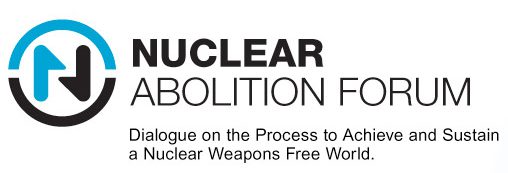April 9, 2013— Government diplomats, UN officials, disarmament researchers, policy analysts, academics and representatives of non-governmental organizations attended the launch on April 9 of Moving Beyond Nuclear Deterrence to a Nuclear-Weapons-Free World, the second edition of the Nuclear Abolition Forum, an initiative of the Global Security Institute and seven other international organizations.
 Probably the biggest barrier to making progress on nuclear disarmament and preventing nuclear proliferation is the continued role of nuclear deterrence in security thinking and doctrines. As long as States believe that nuclear deterrence can protect them from aggression, they will resist or block efforts and initiatives for nuclear disarmament. However, around 150 States manage their security without nuclear weapons.
Probably the biggest barrier to making progress on nuclear disarmament and preventing nuclear proliferation is the continued role of nuclear deterrence in security thinking and doctrines. As long as States believe that nuclear deterrence can protect them from aggression, they will resist or block efforts and initiatives for nuclear disarmament. However, around 150 States manage their security without nuclear weapons.
Moving Beyond Nuclear Deterrence to a Nuclear-Weapons-Free World makes a contribution to the disarmament process by exploring the validity, utility and risks of nuclear deterrence. Aimed at advancing dialogue and problem-solving, the publication offers a range of perspectives and opinions on the deterrence doctrine and examines alternative cooperative security approaches which could help facilitate the relinquishment of nuclear deterrence.
The launch was hosted by the Geneva Centre for Security Policy and opened by Ambassador Urs Schmid, Swiss Permanent Representative to the Conference on Disarmament. Schmid highlighted a Swiss initiative, undertaken in collaboration with the ICRC and a number of other governments, to advance the issue of the catastrophic consequences of nuclear weapons as an imperative to achieve their elimination (See Joint statement on catastrophic humanitarian consequences of nuclear weapons).
However, he noted that condemnation of nuclear weapons was not sufficient to move nuclear-weapon States and their allies to abandon nuclear deterrence and eliminate the weapons. An exploration of how to achieve security without nuclear weapons was thus vital to achieve a nuclear-weapons-free world.
 Alyn Ware, Founder of the Nuclear Abolition Forum and the Global Coordinator for GSI’s network of Parliamentarians for Nuclear Non-proliferation and Disarmament, introduced the contents of the publication. He reminded the audience that the first issue of the Nuclear Abolition Forum addressed the theme of “International Humanitarian Law and Nuclear Weapons: Examining the Humanitarian Approach to Nuclear Disarmament.” The current issue includes contributions from authors from both the academic and the policy worlds, examining whether nuclear deterrence can be justified and relevant in the 21st century.
Alyn Ware, Founder of the Nuclear Abolition Forum and the Global Coordinator for GSI’s network of Parliamentarians for Nuclear Non-proliferation and Disarmament, introduced the contents of the publication. He reminded the audience that the first issue of the Nuclear Abolition Forum addressed the theme of “International Humanitarian Law and Nuclear Weapons: Examining the Humanitarian Approach to Nuclear Disarmament.” The current issue includes contributions from authors from both the academic and the policy worlds, examining whether nuclear deterrence can be justified and relevant in the 21st century.
He noted that the journal begins with two general perspectives on nuclear deterrence – one from Chris Ford, an advocate of nuclear deterrence, and the other from Ward Wilson, a critic. The journal then looks at nuclear deterrence in national and regional settings – with articles from two different French perspectives – Bruno Tertrais for nuclear deterrence and Paul Quiles (former Defence Minister) against. These are followed by two perspectives from India – Sheel Kant Sharma and Manpreet Sethi – and two alternative perspectives from North East Asia. Nobuyasu Abe and Hirofumi Tosaki argue for extended nuclear deterrence, while Alyn Ware, Kiho Yi and Hiromishi Umebayashi propose an alternative cooperative security framework including a North East Asian Nuclear Weapons Free Zone.
The journal also includes two articles by parliamentarians – Bill Kidd on the Scottish challenge to the British nuclear deterrent and Uta Zapf on parliamentary actions to lower the role of nuclear deterrence in NATO.
Alyn highlighted in particular the article by Jonathan Granoff, President of the Global Security Institute, who writes on the necessity to change the framework of nuclear disarmament from one of State security and risk analysis to one of a global public good.
Granoff says that “Advocacy for the elimination of nuclear weapons has not succeeded. One reason is that the debate is framed within a traditional ‘national risk vs. benefit’ analysis… Within this analytical frame, an argument difficult to overcome is that these weapons provide a beneficial deterrent against a potential, as yet unrealized, unforeseen, unknown and unknowable threat. This threat could be existential and thus eliminating the weapon becomes too risky. According to nuclear weapons advocates, we have a known risk, which is being managed, but the unknown risk could be far worse. The reality is that nuclear weapons are a critical logjam for progress beyond a large complex systemic problem: the lack of a sufficiently broad common security framework that integrates nuclear weapons elimination into the process of addressing all shared threats to human survival… We must place the elimination of nuclear weapons in the context of achieving the entire menu of existential global public goods.”
Rob van Riet writes on a trans-generational approach to nuclear disarmament, noting in that its achievement will probably span generations, failure to achieve it is a liability to future generation, the maintenance of such a nuclear- free regime will be the responsibility of future generations, and inter-generational discourse is vital in order to understand the reasons for current nuclear doctrines and to forge viable solutions within emerging political realities.
David Krieger and Richard Falk have a dialogue on how nuclear deterrence manifests in political reality, covering a wide range of issues and perspectives related to the doctrine, including objectives of current deterrence strategies, rationales for maintaining deterrence, and possibilities to renounce nuclear deterrence.
The journal concludes with an overview and summary of academic and policy perspectives on nuclear deterrence categorized into three general characteristics of nuclear weapons as protective/durable, dangerous, outmoded – plus a fourth approach of constructivist approach which uses such analysis to address the question of how to move beyond nuclear deterrence to achieve a nuclear weapons-free world.
 Jean-Marie Collin, Coordinator for France of Parliamentarians for Nuclear Non-Proliferation and Disarmament (PNND), announced a tectonic shift in the nature of the debate on nuclear deterrence in France. He noted that until recently there was a general political consensus on the need for France’s nuclear deterrent, with no debate in the main public arenas including parliament. But now, former high-level officials and the parliament are starting to raise questions and consider the prospect of a nuclear-weapons-free world. This is reflected, for example, by the article in the Moving Beyond Nuclear Deterrence to a Nuclear-Weapons-Free World, by Paul Quiles – and his recent book Arretez ls Bombe (co-written with Jean-marie Collin and Bernard Norlain) which opens the debate even further.
Jean-Marie Collin, Coordinator for France of Parliamentarians for Nuclear Non-Proliferation and Disarmament (PNND), announced a tectonic shift in the nature of the debate on nuclear deterrence in France. He noted that until recently there was a general political consensus on the need for France’s nuclear deterrent, with no debate in the main public arenas including parliament. But now, former high-level officials and the parliament are starting to raise questions and consider the prospect of a nuclear-weapons-free world. This is reflected, for example, by the article in the Moving Beyond Nuclear Deterrence to a Nuclear-Weapons-Free World, by Paul Quiles – and his recent book Arretez ls Bombe (co-written with Jean-marie Collin and Bernard Norlain) which opens the debate even further.
Another indication is that in February this year, a number of parliamentarians of different political groups in the Senate and the National Assembly asked formal questions of the government about its position on the Oslo conference on humanitarian consequences of nuclear weapons. (See, for example, National Assembly question asked by Denis Baupin MP, and Senate question asked by Senator Michelle Demesinne). Jean-Marie reported that these kinds of question in the past were never asked.
 Teresa Bergman, Research Officer at the Basel Peace Office, addressed the range of academic analysis of the nuclear deterrence doctrine, outlining four waves (periods) with distinguishing features – Post-WWII (nuclear power and catch-up), 1950s-60s (development of Classic Deterrence Theory), mid 1960s-90s (expansion of roles and applications of deterrence), and the Post-9/11 world (a multipolar world with changing threats and the rise of non-state actors). Bergman also identified different approaches within these waves including ‘realist’, ‘rationalist’, ‘liberal’, and ‘constructivist.’ She indicated that the constructivist approach has the best possibility to address the real security issues of the 21st Century and support a process to move beyond nuclear deterrence to achieve a nuclear-weapons-free world.
Teresa Bergman, Research Officer at the Basel Peace Office, addressed the range of academic analysis of the nuclear deterrence doctrine, outlining four waves (periods) with distinguishing features – Post-WWII (nuclear power and catch-up), 1950s-60s (development of Classic Deterrence Theory), mid 1960s-90s (expansion of roles and applications of deterrence), and the Post-9/11 world (a multipolar world with changing threats and the rise of non-state actors). Bergman also identified different approaches within these waves including ‘realist’, ‘rationalist’, ‘liberal’, and ‘constructivist.’ She indicated that the constructivist approach has the best possibility to address the real security issues of the 21st Century and support a process to move beyond nuclear deterrence to achieve a nuclear-weapons-free world.
Finally, Marc Finaud, Senior Advisor to the Emerging Security Challenges Programme at GCSP, presented a paper Cooperative Security: A New Paradigm for a World Without Nuclear Weapons, which considers that changing the current security doctrines to adopt the paradigm of cooperative security could reduce and eventually eliminate the rationale of nuclear deterrence. However, such progress would require attention to the underlying motives for nuclear deterrence – fear and power.
 Finaud provided a useful definition of cooperative security – “a process whereby countries with common interests work jointly through agreed mechanisms to reduce tensions and suspicion, resolve or mitigate disputes, build confidence, enhance economic development prospects, and maintain stability in their regions”. He proposed four steps towards cooperative security – disconnecting the permanent membership of the UN Security Council from possession of nuclear weapons, addressing the regional conflicts which fuel nuclear proliferation, promoting synergies between regional and global disarmament, adoption (particularly by the nuclear weapon States) of new security doctrines related to the emerging globalised world.
Finaud provided a useful definition of cooperative security – “a process whereby countries with common interests work jointly through agreed mechanisms to reduce tensions and suspicion, resolve or mitigate disputes, build confidence, enhance economic development prospects, and maintain stability in their regions”. He proposed four steps towards cooperative security – disconnecting the permanent membership of the UN Security Council from possession of nuclear weapons, addressing the regional conflicts which fuel nuclear proliferation, promoting synergies between regional and global disarmament, adoption (particularly by the nuclear weapon States) of new security doctrines related to the emerging globalised world.
The discussion session that followed focused on nuclear deterrence in current conflict areas including North East Asia and the Middle East – with an emphasis on ways that confrontation and conflict could be shifted towards cooperative security in order to reduce the risks of nuclear proliferation, recourse to military action to prevent such proliferation, or even the possible use of nuclear weapons.
The Nuclear Abolition Forum thanks the Swiss Federal Department of Foreign Affairs for their financial support for the production of Moving Beyond Nuclear Deterrence to a Nuclear-Weapons-Free World, and the Geneva Centre for Security Policy (GCSP) for hosting the launch event.
Jonathan Granoff is the President of the Global Security Institute, a representative to United Nations of the World Summits of Nobel Peace Laureates, a former Adjunct Professor of International Law at Widener University School of Law, and Senior Advisor to the Committee on National Security American Bar Association International Law Section.








